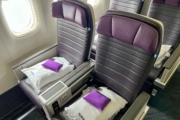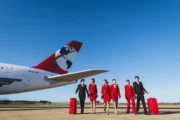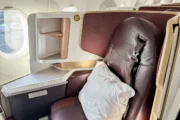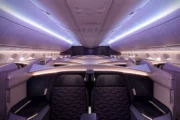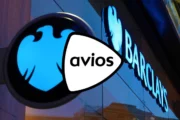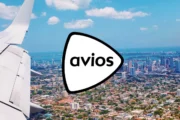-
Hi all, last night my family and I were on the delayed TOM2119 from Halkidiki to Manchester. According to Flight Stats, the actual arrival time was 01:49 BST, which sounds about right in terms of touching down. However, my understanding has always been (correctly or otherwise) that the applicable time for EU261 is not touchdown, but when the plane doors open. This was far later – we had a long taxi and then a wait for the stairs.
The 3-hr cut-off for EU261 (or UK261) compensation would have been 02:05 BST, and I know for a fact the doors weren’t open at this time. Other people on board were also aware, and photographing the closed door – I couldn’t do this myself as I was attending to my upset child.
My view is that the time recorded on Flight Stats is not the applicable time for assessing whether compensation is due. There are some references to this online albeit dated ones such as: https://www.bottonline.co.uk/flight-delay-compensation/claim-guides/definition-of-arrival-time
My questions:
1) Have I got this right, or am I misremembering / it has changed?
2) Are there reliable sources online that record this time-stamp (rather than touchdown, as appears to have been published by Flight Stats) that I can use to self-assess and potentially support my claim?Thanks.
You are correct about doors opening, according to many posts here, however what was the reason for the delay? It was a bit stormy with heavy rain and flood warnings in place in Manchester yesterday, I don’t know if that had anything to do with it?
Not only doors (or at least the usual front door) opening but it must also be possible for the first passenger to exit.
So if the door is open but BA’s widest crew member is in the doorway with her back to you blocking the exit because the ramp isn’t connected or the stairs connected, that doesn’t count till the crew member moves aside, removes any rope barrier and the first passenger is free to leave the plane.
Thank you.
The reason for delay was given as:
1) In writing, during the delay period, ” ” (yes, a series of blank spaces, in an email from Tui)
2) Verbally by the pilot, “technical problems at Manchester”, which had led to a replacement plane for the preceding flight, and direct knock-on effect for this one.I don’t think this qualifies as extraordinary.
So, in principle, I believe we’re due the comp, but in practice will face a battle proving it, unless there are better sources of arrival time-stamps than Flight Stats which doesn’t have the applicable time?
I would just make a claim anyway. It is up to the airline to provide a reason for rejecting the claim. It is not up to you to prove that you have a valid claim.
We arrived at a remote stand and the doors opened 3 mins inside 3 hours but we had to wait 5 mins for a bus – Claimed and was paid appropriately…
Even so, there’s no point going to the bother of submitting a claim if it’s blindingly obvious that it doesn’t qualify. That just clogs up the system for everyone else (just a point, not saying this applies to @Crafty – I was genuinely interested here as I felt some of the brunt of the Manchester weather over the weekend!)
Do you know that the airplane doors were all still closed at 02:05? You haven’t said what time the doors opened, but presumably you must know since you were there.
If it was 2.05 or later, put a claim in. If it was before 2.05 then forget about it. The airline will know the times, and are unlikely to lie about them (but if you know that they are, come back here).
Do you know that the airplane doors were all still closed at 02:05? You haven’t said what time the doors opened, but presumably you must know since you were there.
If it was 2.05 or later, put a claim in. If it was before 2.05 then forget about it. The airline will know the times, and are unlikely to lie about them (but if you know that they are, come back here).
When you say the airline are “unlikely to lie about them”, what are you basing this likelihood as being ‘unlikely’ on? Many of us have experience of quite the opposite so I’m intrigued at your belief that any airline will offer up honesty at the first pass.
Do you know that the airplane doors were all still closed at 02:05? You haven’t said what time the doors opened, but presumably you must know since you were there.
Thank you. In the original post, I stated that I do know this – I could see the closed door – but won’t be able to provide evidence.
Can we claim duty of care in addition? We incurred 52 euros of food and drink costs during the 3+ hour delay at the airport (there were 5 of us). I filled in the TUI Airways claim form for the delay, but all fields are closed so I couldn’t add a claim for this.
Yes, they still owe duty/right of care regardless of the reason for the delay. Did they not even offer vouchers?
No, they had zero staff presence at the outstation airport at all.
TUI have come back trying to say the delay was 178 minutes, from a no-reply email address. Looks like the arrival time has been “manipulated” so to speak. Speaking to customer service, they won’t listen to anything further on the matter, saying just to go straight to ADR. At which I expect it’ll be my word against theirs, since I’ve no proof of the time the doors opened, just that of my own eyes and ears.
Any ideas or recommendations from others who’ve been in such a position? Correct course of action to go straight to ADR as they have told me?
@crafty – the burden of proof is on TUI, not you. TUI will have to provide evidence to AviationADR that the delay was 178 minutes and not whatever time you say it was. It’s possible that TUI might also adjust its story to add some element of ‘extraordinary circumstances’ to account for part of the delay. The problem in these cases is that as a practical matter it’s very difficult for the passenger to provide any real evidence. It appears that sometimes people video or photograph with a timestamp but that really doesn’t prove anything as it’s so easy to fake.
Re the right to care costs, it will depend on the time of day and reasonableness of the €52 in the context of the delay.
Just to add – don’t be put off by the ADR process itself, it’s incredibly simple and straightforward.
I have a feeling they might settle if you put a clear simple claim in to ADR. They may simply decide it’s not worth the cost of professional time defending.
Good luck and please post how you get on.
Thank you. I will. Encouragement appreciated.
Update for anyone interested –
1. The four week deadline passed without response. The day after the deadline, ADR told me TUI had requested a 2 week extension, which was granted.
2. On the final day of the extension, a highly legalistic and quite aggressive document was uploaded. Unfortunately, a flight log was included with a doors opening time 2 hours and 58 minutes behind schedule. Although I contend that, as a passenger on the flight, the door was visibly closed at this time and there was no prospect of disembarking, I feel the evidence is stacked against me (I have none of my own).
3. They have even had the gall to say that even if the delay had been 3 hours, claiming 10 euros per person (52 euros in total, for a family of 5) for food and beverage is “excessive”! I’d like to see them cope with 3 children during a 3 hour late night flight delay!
I assume I have nowhere left to go with this, and that ADR will automatically find in TUI’s favour due to the flight log, but would appreciate any thoughts just in case.
@Crafty – I’m afraid that in these circumstances the passenger is never going to have sufficient evidence (and forget any suggestion of photos/videos) to contradict the flight log. I appreciate you don’t agree with the timings but it would be quite extraordinary if the flight crew faked entries of their own initiative (if it’s not automated) or under standing instruction from management.
Flight crew are highly trained professionals and should be trusted to do the right thing, and would not compromise their ethics in this way. If it were discovered that any faking was going on to avoid compensation payments, a lot of heads would roll and the reputational and financial cost to TUI would be huge as it was for Tesco when a few employees fudged the figures.
TUI is being a bit ridiculous re the €52 – €10pp is about the level and the sort of sum that might get offered in vouchers.
Hello, for anyone following, ADR dismissed my claim entirely. They backed TUI’s claim that the doors opened 2 hours and 58 minutes late and that this was suitable. Although they acknowledged that it’s only an “assumption” that doors being open allows passengers to leave, they would have wanted evidence that we could not leave.
They also rejected my claim to 52 euros for food and drink. I found the reasoning odd. ADR claimed that such costs could ONLY be INCURRED at least 3 hours after scheduled departure time in order to be eligible. I don’t think there is any such stipulation in the actual guidance, which refers to flights being EXPECTED to be 3 hours late or more! Not going to pursue it given the small value but found this a bit irritating.
@Crafty – I’m sorry to hear this but winning on a ‘doors opening’ argument is very difficult and the “assumption” word comes from the judgment in Germanwings vs Henning that determined what constituted the ‘arrival time’ – relevant para copied below. There are posters who add all sorts of elaborations about cabin crew in the doorway etc. but that’s simply incorrect.
Re the €52 it does seem very mean but it’s all subjective, even with the ‘necessary, appropriate and reasonable’ test and the proportionality of wait vs need – AviationADR isn’t right or wrong.
In the light of all of the foregoing considerations, the answer to the referring court’s question is that Articles 2, 5 and 7 of Regulation No 261/2004 must be interpreted as meaning that the concept of ‘arrival time’, which is used to determine the length of the delay to which passengers on a flight have been subject, refers to the time at which at least one of the doors of the aircraft is opened, the assumption being that, at that moment, the passengers are permitted to leave the aircraft.
@JDB I disagree with recording not being useful. It’s very useful when the recording includes crew announcement about disembarkation (usually the case!). I won against BA at MCOL once precisely because I had the recording. Flight logs can also be manipulated by airlines. It is also very difficult to claim that the recording is fake and this can be independently verified if need be.
No one’s disputing the flight log which would have recorded the ‘doors open’ instruction to staff. But it’s quite frequent that this instruction might be given but more time is still needed before the exit path is finally made available so that the first passenger can exit. Whether a bus completing lining up, stairs brought and connected, ramp connection completed etc. Only once that’s done will cabin crew remove the rope across the doorway and / or themselves put of the open doorway. And then passengers will be allowed to disembark.
So in this case the assumption that passengers could exit immediately the doors had been permitted to be open was not correct. Of course statements of passengers or even actual timed photos of closed doors can be questioned. But really especially at ADR / conciliation level and not even court, there comes a point where if a pasenger says it was still notably later that the first pasenger was permitted to exit the aircraft then it’s reasonable to believe that here was an alert passenger that was taking note whose information is correct.
Especially as once an aircraft is delayed, all sorts of other things are often then delayed in a chain reaction. eg bus arrival if now needed, luggage offload and delivery, gate availability, unscheduled availability of ground welcoming staff meeting pasengers off the flight, due to not having been acheduled for the later landing time.
The fact that.the adjudicator supported TUI’s refusal of the miserable 10 or so Euros per passenger for victuals during the delay, when you’re right about a delay only needing to be ‘expected’ for this expense to be claimable …On a TUI route the minimum expected delay for refreshment expense to be claimable is highly likely to be only 2 hours, not 3. This tells me that the adjudicator started out with a presumption in favour of TUI and so was harder to persuade of anything putting a liability on TUI, than they ahould have been.
So the OP did ask the correct question upfront : Where is the actual time the first passenger can leave the aircraft- recorded? We haven’t found that out.
Until there’s a way this would have to be recorded in official aviation records, then it seems the burden of proof in cases where the time when passengers were allowed to disembark was substantially later than things that are officially recorded like wheels down and the door opening, is too high if you get an adjudicator who won’t be open to the realistic reporting by a passenger of when they specifically noted the first passenger was permitted to disembark.
This does seem unfair and the OP tried to head it off. I’m sorry we’ve not been able to come up with a way to counter adjudicators’ automatic acceptance of claims by airlines that door open= able to disembark. When we all know that particularly on delayed airvraft this is very frequently not the case.
Hopefully someone on Flyertalk might one day post a way that works to counter a demand for evidence that currently it seems airlines don’t have to record on a key point affecting compensation.
@LadyLondon – there is absolutely no requirement for anything more than for a door to be open. That is what the ECJ says, not me, and the final decision of the court is copied in full below. You will see that the “assumption” is the wording provided by the court. All the rest of the stuff you cite about ability to disembark, ropes, people, buses etc. is totally irrelevant to the arrival time for the purposes of EC261 – it’s just some random verbiage plucked from I don’t know where and it’s simply wrong. The time the first passenger disembarks is also irrelevant and of zero probative value.
On those grounds, the Court (Ninth Chamber) hereby rules:
Articles 2, 5 and 7 of Regulation (EC) No 261/2004 of the European Parliament and of the Council of 11 February 2004 establishing common rules on compensation and assistance to passengers in the event of denied boarding and of cancellation or long delay of flights, and repealing Regulation (EEC) No 295/91, must be interpreted as meaning that the concept of ‘arrival time’, which is used to determine the length of the delay to which passengers on a flight have been subject, refers to the time at which at least one of the doors of the aircraft is opened, the assumption being that, at that moment, the passengers are permitted to leave the aircraft.
[Signatures]
@JDB the jibe in your text about “there are posters who add all sorts of elaborations about cabin crew in the doorway etc.” did not go unnoticed and clearly was intended as a putdown on my previous post.
As was the earlier ‘some posters only dispense tea and sympathy’ remark on another thread.
Unfortunately tea and sympathy and proposed ways of presenting things have helped posters here make their cases to obtain redress successfully. Including some cases where not every poster (cough! cough!) was giving positive feedback.
I know you might be still put out by, for example, the success enjoyed by so many posters in our campaign against the mistreatment of cardholders by Creation. But scattering little digs to undermine posters whose orientation is to try to find aspects that might help a claim succeed, makes me wonder is there an element of fear there?
- You must be logged in to reply to this topic.







